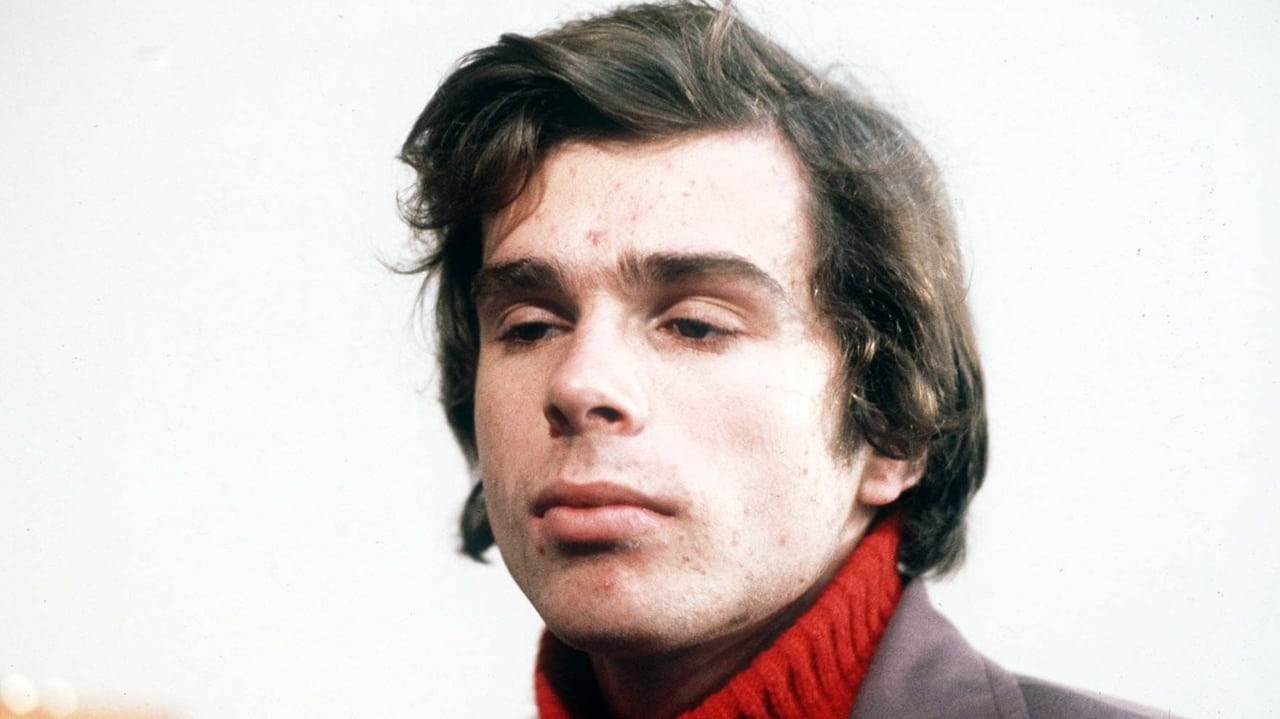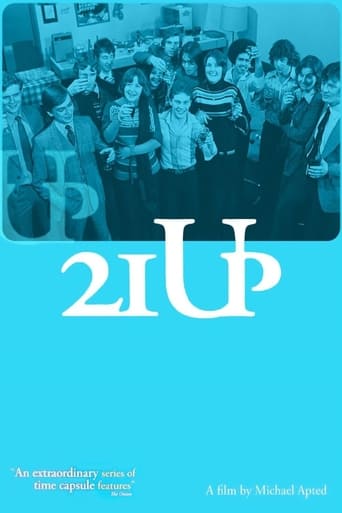

Not even bad in a good way
... View MoreIt was OK. I don't see why everyone loves it so much. It wasn't very smart or deep or well-directed.
... View MoreThe acting is good, and the firecracker script has some excellent ideas.
... View MoreThis is one of the best movies I’ve seen in a very long time. You have to go and see this on the big screen.
... View MoreThe more "Up" episodes I watch, the more I question the validity of its "show me a boy until he's seven" slogan.I was the first to agree with the notion of a certain point of childhood where your becoming as an adult is pretty much sealed. But how depressing life would be if that was true! If our personality is conditioned by social, material, physical and cultural factors, circumstances do have a say, don't they? And maybe the real achievement is to be able to defeat the odds and beat any adversity undermining the path we're building.Take the Yorkshire kid, Nicholas. In my review of the "14 Up" short, I referred to him as a "painfully shy" teenager with the voice of the McLovin actor. I really expected him to grow more timid, isolated... unhappy. Instead, I saw a dashing handsome young man who built quite a lot of confidence and charisma. He studies physics, helps his father in a farm and provides a nice comment about his childhood's "nervous" answer about girls, calling it sensitive, this boy has learned to look at the bright side of life, basically, proving his previous awkwardness to be just a phase.Another surprise came from Jackie, the chubbier girl from the girls' trio. I mean no disrespect but she always struck me as the more 'homely' one and I knew she was going to be married by the time of the 'next' documentary. But I just love how assuming she is and that she always talks about marriage as a source of balance and happiness. Lynn is also married, Sue not yet, but when they are asked various questions about life and marriage, it's Jackie who takes the lion-share of answers, some tough cookie! And when asked if she wished she had the same chances than Suzie, the rich girl, she doesn't even take Suzie's happiness for a fact, and if only she knew how right she was, unfortunately...Indeed, at that part of the documentary, we knew already that Suzie wasn't really happy. She seemed to be the one who had the harder time, despite being that disciplined girl, dancing ballet and born in a rich family. A divorce when she was fourteen made her lose faith about marriage as an institution and a lifestyle and she became a chain smoker. She exposes her personal views without the pretension of holding them as truths, which makes her sadder than cynical. Some achievements though we could see coming. The three posh kids grew up almost as expected, John is the perhaps the most blatant case of a successful education, Cambridge studies and such, and I wasn't the bit surprised when I heard he wanted to be a barrister. On the other hand, Charles was glad his plans didn't go as expected (he didn't make it to Oxford) and seems to have gotten rid of this "rich kid" look... if Charles is the one with divorced parents (I'm still not sure about some names). Charles' so called failure was a nice twist on the previous episode where the three kids were exactly in the schools they expected Life can derail your plans and that's how it teaches you the best lessons. But as Charles or John (or was it Andrew) pointed out: the merit of an education is less to program you for success than to guarantee a safety net, just like the protection of your parents in case you fail. As usual, the documentary doesn't even need to rely on a particular editing, each layer of life's complexity is covered by one of the protagonists. Three portraits were particularly riveting: Bruce, the missionary kid, always extremely mature and convinced he had to find himself before finding the right girl. His sentiment echoed what someone said about money, it's not about needing something but being aware of what you miss in priority. There was also Simon, who I expected to grow a bit bigger, like the Muhammad Ali he referred to, it was sad to see him working in an average blue-collar job, but he knew he still had to figure out what to do in his future, but he wasn't set-up, unlike his childhood friend Paul who had emigrated to Australia.Maybe Simon indirectly highlighted the merit of education, it gives you options. But then you have Little Tony who brings the counter-argument. He's always dreamed to become a jockey, he was a stable boy, made it as a jockey for a brief time then became a cab driver. His small stature doesn't bother him and at least, he's moving forward and makes end meet. He's one of these "instantly recognizable" faces of the program and I just love how confident and optimistic he stays.Now, it would be impossible to cover all the documentary in one review, especially since this one is much longer (surely at 21 we have more things to say). And the insights from Neil and Peter were also relevant, Neil was kept for the end probably because most of his statements worked in a conclusive way and leaves many doors open for the next episode. As for Andrew, he gives one of most memorable answers when he says his dream is to leave a mark in this world, maybe that says a lot about his age. At 21, we start to question the value of our life and no matter how different our challenges are, we all try to make life valuable.Watching him talking about dreams, maybe Apted was thinking at that moment, "well, I know, I'm leaving that documentary for posterity". It is a fantastic work and it says a lot that the film featured a reunion (unlike the "teen" episode) maybe because they were finally aware they went on board on a very special program and they were interested to have other insights and perspectives... just like us.
... View MoreDirector Michael Apted returns to interview these young adults who are now 21 year olds. They are starting to get interesting. They are no longer little kids talking without comprehension.It starts off with the group watching themselves in the first two movies. Of course Apted starts with Nicholas, the scientist in the group. He pontificates and reflects on the past films. I wonder how much the films are affecting these kids. I wonder who dreads the upcoming interviews. I wonder if they try extra hard to look good in these films.The most compelling are Neil and Suzy. Neil has drop out and working in menial jobs. He's dropping out of society. And Suzy is now fully into her role as the poor little rich girl. We find out that her parents separated soon after '7 Plus Seven'. These kids from the various walks of life is starting to gain colors. And not all the colors are pretty. But Michael Apted is digging deeper now and we're gaining more insights.
... View MoreThe 'Up Series' represents one of the most fascinating and unusual uses of film in cinema history - a documentary life-long chronicle of the lives of 14 people starting at 7 years old, revisiting them every seven years through age 49 (so far). While I could quibble, wishing for a bit more depth here and there (especially with the women, where there's a bit too much emphasis on love and marriage at the expense of all else), it's really an astounding, moving, frightening and uplifting document. There's no way to watch this remarkable series of films without reflecting deeply on one's own life, and how you have changed (and stayed the same) over your own lifetime. While Michael Aped deserves every bit of credit he's received for this amazing piece of cultural anthropology, it's important to note this first film, 7 Up,was actually directed by Paul Almond, and Apted was a that point a researcher for the project.
... View MoreHere, the Up series began in earnest. "Seven Up!" and "7 plus Seven" were shorter, and the interviewees, naturally, didn't have much of interest to say. Listening to what silly things cute children have to say doesn't make for a very serious or interesting documentary. The interviews at 14 weren't of much initial value, either, especially with the shyness of two of the participants. Yet, I did enjoy listening to and contrasting the political ideals of young socialist Bruce and conservative John, as well as contrasting their manners. The first two segments do gain importance and value, though, with this and the following installments, as parts of them are intercalated with the new interviews. It's not even necessary to see previous Ups, as a result; each of the latter documentaries stands well on its own.At twenty-one, the subjects are now young adults and are naturally more insightful, reflective and, importantly, more articulate. Here, as well, Neil had taken shape as the most compelling figure in the series; he is now melancholic, nervous and poor. And, in this episode, he is bitter when discussing his parents and upbringing. With the other participants, I saw confidence and contentment, especially compared to when they were teenagers, even if they were uncertain of their futures--or chain smoking.What Michael Apted and the filmmakers did with the film that I especially liked was that they brought the gang together to watch the previous two films and caught their reactions to the films and asked them their thoughts on the series. Generally, it seems, they don't see the importance or purpose of the series; perhaps, they even see it as somewhat of an intrusion. I suppose I wouldn't see the purpose or significance of the first two films, either, without having seen "21" and the subsequent films that aggrandize upon their beginnings; it's the subsequent films that give the previous ones significance. As far removed or alienated as one seems at twenty-one from his seven-year-old self, the Jesuit proverb still holds truth, as Apted discovers.Early in the film, Neil says that by bringing the group together, the filmmakers might be defeating their original purpose of examining class, or socioeconomic, barriers. And, that focus does seem to be forgotten at times in this addition, although, I suspect, for different reasons. Not only has the series taken on more significance than its initial intent, but also, the interviewees are now more concerned with themselves; even on their pasts, there is more reflection and insight. They're looking inward, planning and thinking about their futures and thus looking forward.
... View More